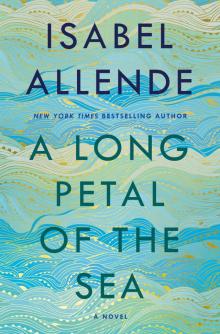- Home
- Isabel Allende
A Long Petal of the Sea Page 8
A Long Petal of the Sea Read online
Page 8
“Who is with you now?”
“For the moment it’s just me, but Victor and his brother, Guillem, will be arriving: Guillem is the father of my child. Also a friend by the name of Aitor Ibarra, and possibly Victor and Guillem’s mother, Carme Dalmau. When they do get to France, please tell them where I am. I hope they find me before the birth.”
“You can’t stay here, Roser. I’m trying to help the pregnant women and those with breastfeeding children. No newborn child can survive in these camps.”
Elisabeth told her she had opened a house to shelter mothers-to-be, but as the demand was so great and space so limited, she had her eye on an abandoned mansion in Elne. Her dream was to set up a proper maternity home, an oasis for the women and children in the midst of so much suffering. But it would have to be built up out of the ruins, and that would take months.
“But you can’t wait, Roser, you must get out of here right away.”
“How?”
“The camp commander knows you’ll be coming with me. The truth is, the only thing they want is to get rid of the refugees. They’re trying to force them back into Spain, but anybody who can find a sponsor or a job can go free. So come with me.”
“There are lots of women and children here. Pregnant women too.”
“I’ll do what I can. I’ll come back with more help.”
* * *
—
OUTSIDE THE CAMP, A car with the Red Cross insignia was waiting for them. Elisabeth decided that what Roser needed most was hot food, and so stopped at the first restaurant they came to. The few customers there at that time of day couldn’t conceal their disgust at this smelly beggar accompanying the neat and tidy nurse. Roser ate all the bread put on the table even before the chicken stew arrived. After the meal, the young Swiss nurse drove the car as if it were a bicycle, zigzagging between other vehicles on the road, climbing onto sidewalks and proudly ignoring all the crossroads and traffic lights, which she considered optional. They arrived at Perpignan in no time at all. She took Roser to the house being used as a maternity unit, where there were eight young women, some in the last month of pregnancy, others with newborn babies in their arms.
Roser was received with the unsentimental warmth typical of Spanish women: she was handed a towel, soap, and shampoo and sent off for a shower. An hour later, Roser reappeared in front of Elisabeth, clean, her hair soaking, and wearing a black skirt, a short woolen tunic that covered her belly, and high-heeled shoes. That same evening, Elisabeth took her to the home of an English Quaker couple she had worked with when they were on the Madrid front, offering food, clothing, and protection to child victims of the conflict.
“You can stay with them as long as necessary, Roser, at least until you give birth. After that, we’ll see. They’re really good people. Quakers are always to be found where they’re most needed. They’re saints; the only saints I respect.”
CHAPTER 4
1939
I celebrate the virtues and vices
Of the suburban middle classes.
—PABLO NERUDA
“Suburbs”
THE YELLOW HEART
THE REINA DEL PACIFICO LEFT the Chilean port of Valparaiso at the start of May, to dock in Liverpool twenty-seven days later. In Europe, spring was giving way to an uneasy summer, threatened by the drumbeats of an unavoidable war. The previous fall, the European powers had signed the Munich peace treaty, which Hitler had no intention of respecting. Paralyzed, the Western world looked on as the Nazis continued their expansion.
And yet on board the Reina del Pacifico, the echoes of the approaching conflict were muffled by distance as well as the sound of the diesel engines that propelled this 17,702-ton floating city across two oceans. The 162 passengers in second class and the 446 in third found the crossing rather long, but in first class the inconveniences of sea travel vanished in a refined atmosphere where the days flew by and the rolling waves couldn’t spoil the pleasure of the journey. The noise from the ship’s engines barely reached the upper deck, where it was replaced by the soothing sounds of background music, conversation in several languages among the 280 passengers, the comings and goings of seamen and officers dressed in white from head to foot and waiters in uniforms with gold buttons, an orchestra and a female string quartet, the endless clink of crystal glasses, porcelain crockery, and silver cutlery. The kitchen only closed during the darkest hour before dawn.
In her suite with two bedrooms, two bathrooms, a salon, and a balcony, Laura del Solar groaned as she struggled into a girdle, her ball gown still waiting for her on the bed. She had kept it especially for tonight, the second to last of the journey, when the first-class passengers showed off all that was most elegant in their trunks and their most impressive jewelry. Her dressmaker in Santiago had already let six centimeters out on the seams of the pleated blue satin gown she had ordered from Buenos Aires, but after several weeks at sea, Laura could hardly fit into it. Her husband, Isidro del Solar, smiled contentedly as he adjusted the white tie of his tuxedo in the mirror’s beveled glass. Less sweet-toothed and more disciplined than his wife, he hadn’t put on weight, and at fifty-nine was still good-looking. He had changed little over their years of marriage, unlike his wife. Laura sank into the Gobelin upholstered armchair, head down and shoulders drooping. She was in despair.
“What’s wrong, Laurita?”
“Do you mind if I don’t accompany you tonight, Isidro? I’ve got a headache.”
Her husband stood in front of her with the annoyed expression that always overcame her resistance.
“Take a couple of aspirins, Laurita. It’s the captain’s dinner tonight. We’re at an important table, I had to work wonders bribing the maitre d’ to get seats. There are only eight of us; your absence would be noted.”
“The thing is, I don’t feel well, Isidro…”
“Make an effort. For me, this is a business dinner. We’re going to be sharing the table with Senator Trueba and two English businessmen who’re interested in buying my wool. I told you about them, remember? I already have an offer from a military uniform factory in Hamburg, but it’s hard to do deals with Germans.”
“I don’t think Señora Trueba will be there.”
“That woman is very eccentric. They say she talks with the dead,” said Isidro.
“Everyone talks to the dead now and then, Isidro.”
“What nonsense you come out with, Laurita!”
“I can’t fit into the dress.”
“What do a few extra kilos matter? Wear another one. You always look pretty,” he said, in the tone of someone who has repeated the same thing a hundred times.
“How do you expect me not to get fat, Isidro? All we’ve done on board is eat and eat.”
“Well, you could have taken some exercise—swum in the pool, for example.”
“Surely you don’t imagine I was going to show myself in a swimsuit?”
“I can’t force you, Laura, but let me say again that your presence at this dinner is important. Don’t leave me stranded. I’ll help you do up your dress. Wear the sapphire necklace, it’ll look perfect.”
“It’s very showy.”
“Not a bit, it’s modest compared to the jewels we’ve seen on other women here on the boat,” Isidro ruled, opening the safe with the key he carried in his vest pocket.
Laura missed their house in Santiago, with its terrace of camellias, a refuge where little Leonardo played and where she could knit and pray in peace, protected from her husband’s noisy whirlwind of frenetic activity. Isidro del Solar was her destiny, but marriage weighed on her like a burden. She often envied her younger sister, sweet Teresa, a cloistered nun who spent her days in meditation, pious reading, and embroidering the trousseaus for brides-to-be in Chilean high society. An existence devoted to God, without all the distractions Laura suffered from: without having to worry about the melo
dramas of children and relatives, or do battle with domestic staff, waste time on social visits, and fulfill her role as a dutiful wife. Isidro was omnipresent: the universe revolved around him, his wishes and demands. That was how his grandfather and father had been, that was how all men were.
“Cheer up, Laurita,” said Isidro, struggling with the tiny clasp on the necklace he had already hung around her neck. “I want you to have a good time, for this trip to be memorable.”
What had been memorable was the journey they had made several years earlier on board the newly launched liner Normandie, with its dining room for seven hundred guests, Lalique lamps and chandeliers, art deco design, and a winter garden with exotic caged birds. In just five days between France and New York, the del Solars had experienced a luxury unknown in Chile, where sobriety was a virtue and the more money one had, the more care was taken to hide it. Only Arab immigrants grown rich in commerce flaunted their wealth, but Laura did not know anyone of that ilk—they were outside her circle and always would be.
She and her husband had traveled on the Normandie on a second honeymoon, after leaving the five children with their grandparents, the English governess, and the maids. The surprise result was another pregnancy, when Laura was least expecting it. She was convinced it was during that short trip that they produced Leonardo, the poor innocent, her Baby. The child was born several years after Ofelia, who until then had been the youngest in the family. Ofelia had come with them on this voyage, and was staying in the other bedroom in the suite.
Although the Reina del Pacifico could not compete in terms of luxury with the Normandie, it was more than adequate. Laura took breakfast in bed, then dressed around ten for Mass in the chapel, after which she went to get some fresh air on the top deck in the chaise longue reserved for her, where a waiter brought her oxtail broth and bread rolls. From there she went in for lunch, which consisted of at least four courses, and soon it was time for high tea, with sandwiches and cakes. She barely had time to take a nap and play a few rounds of canasta before she had to dress for cocktails and dinner, where she had to force herself to smile and listen to other people’s opinions. Afterward she was obliged to dance. Isidro was fleet of foot and had a good ear, but she moved as heavily as a seal on sand. While the orchestra took a break, the passengers were served a midnight snack of foie gras, caviar, champagne, and desserts. She abstained from the first three, but couldn’t resist the sweets. The previous night the chef, a gargantuan Frenchman, had served up an orgy of chocolate in different shapes, crowned with an ingenious fountain that spouted melted chocolate from the mouth of a crystal fish.
To Laura, this journey was simply another of her husband’s impositions. Where vacations were concerned, she preferred to go to their estate in the south of Chile or their beach house at Viña del Mar, where the days were spent in languorous leisure. Long strolls, tea in the shade of the trees, the family rosary with children and domestic staff. For her husband, this journey to Europe was an opportunity to strengthen social ties and plant the seeds of new business opportunities. He had a full agenda for each of the capitals they were to visit. Laura felt defrauded: this was not really a vacation.
Laura’s family regarded the ability to make money in commercial enterprises as suspicious, typical of the new rich, of the parvenus. They put up with this defect in Isidro because no one could doubt his solid Castilian-Basque lineage, with not a drop of Arab or Jewish blood in his veins. He came from a branch of the del Solars of irreproachable honor, the one exception being his father, who in his mature years fell in love with a modest schoolteacher and had two children with her before the affair was discovered. His numerous family and others in the same social class closed ranks around his wife and legitimate offspring, but he refused to leave his mistress. The scandal was the end of him.
Isidro had been fifteen at the time. That was the last he saw of his father, who continued to live in the same city but descended a couple of steps in the strict hierarchy of the Chilean class system and disappeared from his former entourage. The drama was never mentioned, but everyone knew about it. The abandoned wife’s brothers helped her with a minimal pension and took on Isidro, the eldest child, who was forced to leave school and start work. He turned out to be more intelligent and hardworking than all his relatives put together, and within a few years had attained an economic position appropriate to his family name. He was proud of the fact that he did not owe anyone anything.
At the age of twenty-nine he had asked for the hand of Laura Vizcarra, on the basis of his good reputation and some business ventures that were acceptable in his social milieu: a sheep farm in Patagonia, the import of antiques from Ecuador and Peru, a country estate that produced little profit but considerable prestige. The bride-to-be’s family—descended from Don Pedro de Vizcarra, an interim governor of the colony in the sixteenth century—was a Catholic, ultra-conservative, uneducated, and inward-looking clan. Its members lived, married, and died among themselves, refusing to mix with anyone else and with no intention of getting to learn the century’s new ideas. They were immune to science, art, and literature. Isidro was accepted because he won their sympathy, and because he could prove he was linked to the Vizcarras on his mother’s side.
* * *
—
ISIDRO DEL SOLAR SPENT the twenty-something days at sea cultivating his contacts and doing sports: he played ping-pong and took fencing lessons. He began the day running several laps round the track on deck, and ended it past midnight with friends and acquaintances in the bar and the smokers’ saloon, where ladies weren’t welcome. The gentlemen talked business casually, with feigned indifference: it was in bad taste to show too great an interest; political debate, however, did arouse passions. They received news thanks to the ship’s newsletter: two printed sheets taken from the telegraph that were handed out to passengers each morning. By the afternoon, the news was already out of date; everything was changing so quickly—the world they knew had been turned upside down.
Compared to Europe, Chile was a happily backward and distant paradise. It was true that at this moment it had a center-left government: the president was from the Radical Party and a freemason. He was detested by the Right, and his name was never mentioned by the “best families,” but he wasn’t going to last long. The Left, with its coarse realism and vulgarity, had no future; the owners of Chile would make sure of that.
Isidro met up with his wife to eat and for the evening entertainment. The ship offered movies, theater, music, circuses, ventriloquists, and turns by hypnotists and clairvoyants, who fascinated the ladies and were laughed at by the men. Outgoing and jovial, Isidro enjoyed everything with a cigar in one hand and a glass in the other, not permitting himself to be discouraged by the attitude of his wife, who was scandalized by this forced revelry that had more than a whiff of sin and dissipation about it.
Laura looked at herself in the mirror, fighting back the tears. The gown would look wonderful on another woman, she thought; she didn’t deserve it, just as she didn’t deserve most of what she had. She was well aware of her privileged position, of her good fortune at being born into the Vizcarra family, of marrying Isidro del Solar, and of so many other benefits obtained mysteriously, without any effort or planning on her part. She had always been protected and waited on. She had given birth to six children without ever having changed a diaper or prepared a bottle—the person who saw to all this was Juana, who supervised the wet nurses and servants. Juana had raised the children, including Felipe, who would soon be celebrating his twenty-ninth birthday. It had never occurred to Laura to ask Juana how old she was, nor how many years she had been working in the del Solars’ house; nor could Laura remember how she first arrived.
God had bestowed too much on her. Why her? What was He asking in return? She had no idea, and this debt to the Almighty tormented her. On board the Normandie, curiosity had led her to get a glimpse of life on the third-class deck, disobeying the i
nstructions about not mixing with passengers from other classes for sanitary reasons, as the sign on the door to her suite made clear. If by any mischance there was an outbreak of tuberculosis or any other infectious disease, everyone could end up in quarantine, as the official explained when he intercepted her. Laura saw something she had observed when she accompanied the Catholic Ladies to distribute charity in the Santiago slums: poor people were a different color, with a strange smell; their skin was darker, their hair didn’t shine, their clothes were faded. Who were these people in third class? They didn’t look like beggars or delinquents, but they had the same ashen aspect. Why them and not me? Laura had wondered with a mixture of relief and shame. The question continued to echo in her mind. On board the Reina del Pacifico the class division was akin to that of the Normandie, but the contrast was less dramatic, because times had changed and this was a less luxurious boat. The passengers on the lower decks, in what was now called the tourist class, had embarked in Chile, Peru, and other ports on the Pacific coast and were civil servants, employees, students, small traders, immigrants returning to visit their families in Europe. Laura noted that they were having a much better time than the passengers in first class: the atmosphere was relaxed and festive, with singing, dancing, beer, competitions, and games. No one put on tweed jackets for lunch, silk dresses for tea, formal wear for dinner.
In front of the mirror on this penultimate night of the sea journey, sheathed in her ball gown, perfumed and wearing the necklace she had inherited from her mother, all Laura wished for was a small glass of sherry with a few drops of valerian, then to settle down in her bed and sleep and sleep for months until the end of the journey, until she woke up back in her own home with its cool rooms, back in her world, with Leonardo. She missed him terribly; it was torture to spend so long far away from her son: perhaps when she returned he might not even recognize her—his memory was so fragile, like everything else about him. What if he fell ill? Better not to think of that. God had given her five children, and in addition had sent her this innocent, this pure soul.

 The Stories of Eva Luna
The Stories of Eva Luna The House of the Spirits
The House of the Spirits Paula
Paula Ines of My Soul
Ines of My Soul Of Love and Shadows
Of Love and Shadows Kingdom of the Golden Dragon
Kingdom of the Golden Dragon Daughter of Fortune
Daughter of Fortune City of the Beasts
City of the Beasts Maya's Notebook
Maya's Notebook Eva Luna
Eva Luna Zorro
Zorro In the Midst of Winter
In the Midst of Winter Forest of the Pygmies
Forest of the Pygmies My Invented Country: A Nostalgic Journey Through Chile
My Invented Country: A Nostalgic Journey Through Chile The Japanese Lover
The Japanese Lover Portrait in Sepia
Portrait in Sepia Island Beneath the Sea
Island Beneath the Sea The Soul of a Woman
The Soul of a Woman A Long Petal of the Sea
A Long Petal of the Sea Ines of My Soul: A Novel
Ines of My Soul: A Novel The Sum of Our Days
The Sum of Our Days